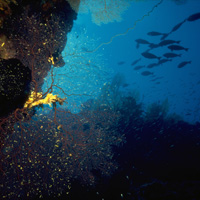
The MacArthur Foundation, which has supported conservation efforts around the world for more than 25 years, today announced three grants totaling $5.5 million for global policy research and analysis projects to help inform and respond to increased pressures from development and climate change.
Carnegie Institution for Science (Washington, DC) will receive $2.8 million to map and monitor watersheds using high-resolution remote measurement and modeling methods. The project will provide data in support of international climate change mitigation efforts and biodiversity conservation agreements.
World Wildlife Fund (Washington, DC) will receive $1.5 million to help change the policies and practices of 100 companies that buy and sell 25 percent of the 15 commodities with the most significant impact on high biodiversity landscapes. If these companies commit to sustainability, global markets may shift to protect the planet human consumption has already outgrown.
United Nations Environment Program World Conservation Monitoring Centre (Cambridge, United Kingdom) will receive $1.2 million to analyze current and projected impacts of major commodities (agricultural, timber, minerals, gas, and oil) on ecosystems and biodiversity in the Great Lakes of East and Central Africa, the Greater Mekong Headwaters, and the Watersheds of the Andes.
The Foundation’s conservation policy grantmaking targets biodiversity conservation at the global scale and reinforces the priorities of MacArthur’s regional work, with a focus on four issues: climate change mitigation and adaptation; understanding and influencing China’s consumption patterns and use of natural resources, particularly in Africa, Latin America, Asia, and the Pacific; integrating environmental and social considerations into commodities markets (for example carbon, timber, oil palm, cotton, and soy); and responding to the overexploitation and illegal use of marine fisheries.
“Meeting the resource needs of an ever-increasing human population will place very significant pressure on the planet’s most biodiverse areas,” said Jorgen Thomsen, MacArthur's Director of Conservation and Sustainable Development. “We must consider and address the significant role of water provisioning, agriculture, fisheries, energy development, and climate change on biodiversity so that we are able to provide these vital resources for future generations.”
MacArthur was the first major private foundation to adopt biodiversity conservation as a core component of its international grantmaking. In March 2011, the Foundation announced a $176 million, ten-year commitment to conservation and sustainable development and a new, broader strategy that builds on the Foundation's historic focus on preserving biodiversity to guide its grantmaking over the next decade. More information is at www.macfound.org/conservation.



